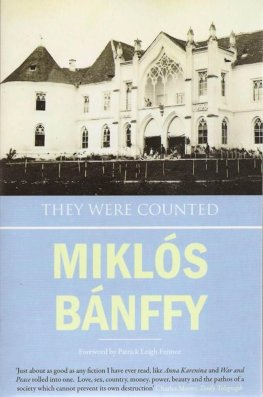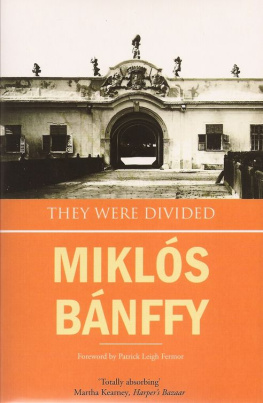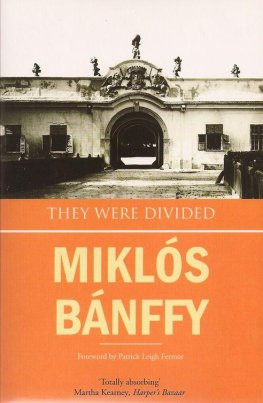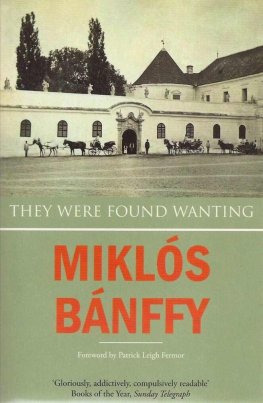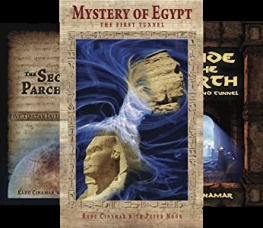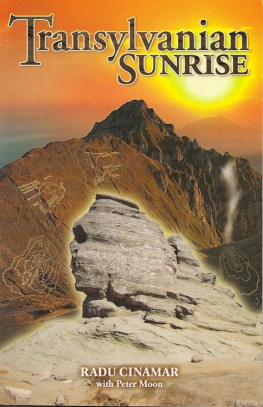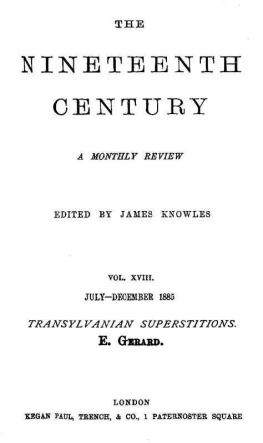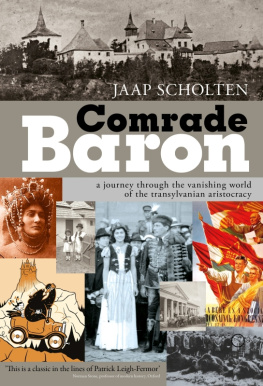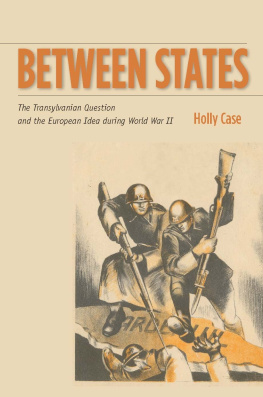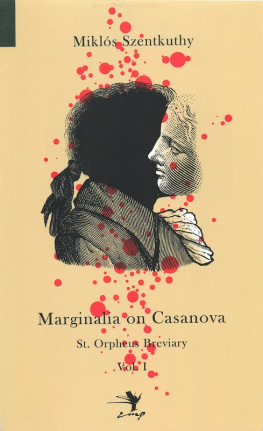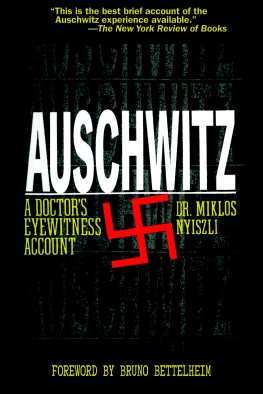Miklós Bánffy - They Were Counted
Here you can read online Miklós Bánffy - They Were Counted full text of the book (entire story) in english for free. Download pdf and epub, get meaning, cover and reviews about this ebook. year: 2009, publisher: Arcadia Books Limited, genre: Prose. Description of the work, (preface) as well as reviews are available. Best literature library LitArk.com created for fans of good reading and offers a wide selection of genres:
Romance novel
Science fiction
Adventure
Detective
Science
History
Home and family
Prose
Art
Politics
Computer
Non-fiction
Religion
Business
Children
Humor
Choose a favorite category and find really read worthwhile books. Enjoy immersion in the world of imagination, feel the emotions of the characters or learn something new for yourself, make an fascinating discovery.
- Book:They Were Counted
- Author:
- Publisher:Arcadia Books Limited
- Genre:
- Year:2009
- ISBN:9781908129024
- Rating:4 / 5
- Favourites:Add to favourites
- Your mark:
- 80
- 1
- 2
- 3
- 4
- 5
They Were Counted: summary, description and annotation
We offer to read an annotation, description, summary or preface (depends on what the author of the book "They Were Counted" wrote himself). If you haven't found the necessary information about the book — write in the comments, we will try to find it.
They Were Counted — read online for free the complete book (whole text) full work
Below is the text of the book, divided by pages. System saving the place of the last page read, allows you to conveniently read the book "They Were Counted" online for free, without having to search again every time where you left off. Put a bookmark, and you can go to the page where you finished reading at any time.
Font size:
Interval:
Bookmark:
Mikls Bnffy
They Were Counted
For my dear children, for whom I first started on this translation of their grandfathers greatest work so that they should learn to know him better, he who would have loved them so much.
K. Bnffy-JelenIn loving memory of Patrick Thursfield, 19232003
PRAISE FOR MIKLOS BANFFY. BNFFY IS A BORN STORYTELLER PATRICK LEIGH FERMOR, FROM THE FOREWORD
A Tolstoyan portrait of the end days of the Austro-Hungarian empire, this compulsively readable novel follows the divergent fortunes of two cousins, the politician Abady and gamble/drunkard Gyeroffy, detailing the intrigues at the decadent Budapest court, the doomed love affairs, opulent balls, duels and general head-in-the sand idiocies of a privileged elite whose world is on the verge of disappearing for ever. Banffy Hungarian count also writes with extraordinary vividness of the natural beauty of his Transylvanian homeland. Two more novels They Were Found Wanting and They Were Divided followed, usually published as The Transylvanian Trilogy Adam Newey, 1000 Novels You Must Read, Guardian
Just about as good as any fiction I have ever read, like Anna Karenina and War and Peace rolled into one. Love, sex, town, country, money, power, beauty, and the pathos of a society which cannot prevent its own destruction all are here Charles Moore, Daily Telegraph
Fascinating. He writes about his quirky border lairds and squires and the high misty forest ridges and valleys of Transylvania with something of the ache that Czeslaw Milosz brings to the contemplation of this lost Eden W. L. Webb, Guardian
Pleasure of a different scale and kind. It is a sort of Galworthisn panorama of life in the dying years of the Habsburg Empire perfect late night reading for nostalgic romantics like me Jan Morris, Observer Books of the Year
Totally absorbing Martha Kearney, Harpes Bazaar
Charts this glittering spiral of decline with the frustrated regret of a politician who had tried to alert Hungarys ruling classes to the pressing need for change and accommodation. Patrician, romantic and in the context of the times a radical, Bnffy combined his politics he negotiated Hungarys admission to the League of Nations with running the state theatres and promoting the work of his contemporary, the composer Bla Bartk Guardian Editorial
Like Joseph Roth and Robert Musil, Mikls Bnffy is one of those novelists Austria-Hungary specialised in. Intimate and sparkling chroniclers of a wider ruin, ironic and elegiac, they understood that in the 1900s the fate of classes and nations was beginning to turn almost on a change in the weather. None of them, oddly, was given his due till long after his death, probably because in 1918 very much was lost in central Europe an empire overnight for one thing and the aftermath was like a great ship sinking, a massive downdraught that took a generation of ideas and continuity with it. Bnffy, a prime witness of his times, shows in these memoirs exactly what an extraordinary period it must have been to live through Julian Evans, Daily Telegraph
Full of arresting descriptions, beautiful evocations of scenery and wise political and moral insights Francis King, Spectator
Plunge instead into the cleansing waters of a rediscovered masterpiece, because The Writing on the Wall is certainly a masterpiece, in any language Michael Henderson, Daily Telegraph
So enjoyable, so irresistible, it is the authors keen political intelligence and refusal to indulge in self-deception which give it an unusual distinction. Its a novel that, read at the gallop for sheer enjoyment, is likely to carry you along. But many will want to return to it for a second, slower reading, to savour its subtleties and relish the authors intelligence Allan Massie, Scotsman
So evocative Simon Jenkins, Guardian
Banffys loving portrayal of a way of life that was already much diminished by the time he was writing, and set to vanish before he died, is too clear-eyed to be simply nostalgic, yet the ache of loss is certainly here. Laszlo has been brought up a homeless orphan, Balints father died when he was young and the whole country is suffering from loss of pride. Although comparisons with Lampedusas novel The Leopard are inevitable, Banffys work is perhaps nearer in feel to that of Joseph Roth, in The RadetzkyMarch. They were, after all, mourning the fall of the same empire Ruth Pavey, New Statesman
ABOUT THE TRANSLATORS
ABOUT THE TRANSLATORS
PATRICK THURSFIELD and KATALIN BNFFY-JELEN are the translators of the Bnffy Trilogy (They Were Counted, They Were Found Wanting and They Were Divided, winner of the Weidenfeld Translation Prize 2002) and The Phoenix Land, also by Mikls Bnffy.
FOREWORD BY PATRICK LEIGH FERMOR
I FIRST DRIFTED into the geographical background of this remarkable book in the spring and summer of 1934, when I was nineteen, half-way through an enormous trudge from Holland to Turkey. Like many travellers, I fell in love with Budapest and the Hungarians, and by the time I got to the old principality of Transylvania, mostly on a borrowed horse, I was even deeper in.
With one interregnum, Hungary and Transylvania, which is three times the size of Wales, had been ruled by the Magyars for a thousand years. After the Great War, in which Hungary was a loser, the peace treaty took Transylvania away from the Hungarian crown and allotted it to the Romanians, who formed most of the population. The whole question was one of hot controversy, which I have tried to sort out and explain in a book called Between the Woods and the Water* largely to get things clear in my own mind; and, thank heavens, there is no need to go over it again in a short foreword like this. The old Hungarian landowners felt stranded and ill-used by history; nobody likes having a new nationality forced on them, still less, losing estates by expropriation. This, of course, is what happened to the descendants of the old feudal landowners of Transylvania.
By a fluke, and through friends I had made in Budapest and on the Great Hungarian Plain, I found myself wandering from castle to castle in what had been left of these age-old fiefs.
Hardly a trace of this distress was detectable to a stranger. In my case, the chief thing to survive is the memory of unlimited kindness. Though enormously reduced, remnants of these old estates did still exist, and, at moments it almost seemed as though nothing had changed. Charm and douceur de vivre was still afloat among the faded dcor and the still undiminished libraries, and, out of doors, everything conspired to delight. Islanded in the rustic Romanian multitude, different in race and religious practice the Hungarians were Catholics or Calvinists, the Romanians Orthodox or Uniat and, with the phantoms of their lost ascendency still about them, the prevailing atmosphere conjured up the tumbling demesnes of the Anglo-Irish in Waterford or Galway with all their sadness and their magic. Homesick for the past, seeing nothing but their own congeners on the neighbouring estates and the few peasants who worked there, they lived in a backward-looking, a genealogical, almost a Confucian dream, and many sentences ended in a sigh.
It was in the heart of Transylvania in the old princely capital then called Kolozsvr (now Cluj-Napoca) that I first came across the name of Bnffy. It was impossible not to. Their palace was the most splendid in the city, just as Bonczhida was the pride of the country and both of them triumphs of the baroque style. Ever since the arrival of the Magyars ten centuries ago, the family had been foremost among the magnates who conducted Hungarian and Transylvanian affairs, and their portraits, with their slung dolmans, brocade tunics, jewelled scimitars and fur kalpaks with plumes like escapes of steam hung on many walls.
Font size:
Interval:
Bookmark:
Similar books «They Were Counted»
Look at similar books to They Were Counted. We have selected literature similar in name and meaning in the hope of providing readers with more options to find new, interesting, not yet read works.
Discussion, reviews of the book They Were Counted and just readers' own opinions. Leave your comments, write what you think about the work, its meaning or the main characters. Specify what exactly you liked and what you didn't like, and why you think so.

